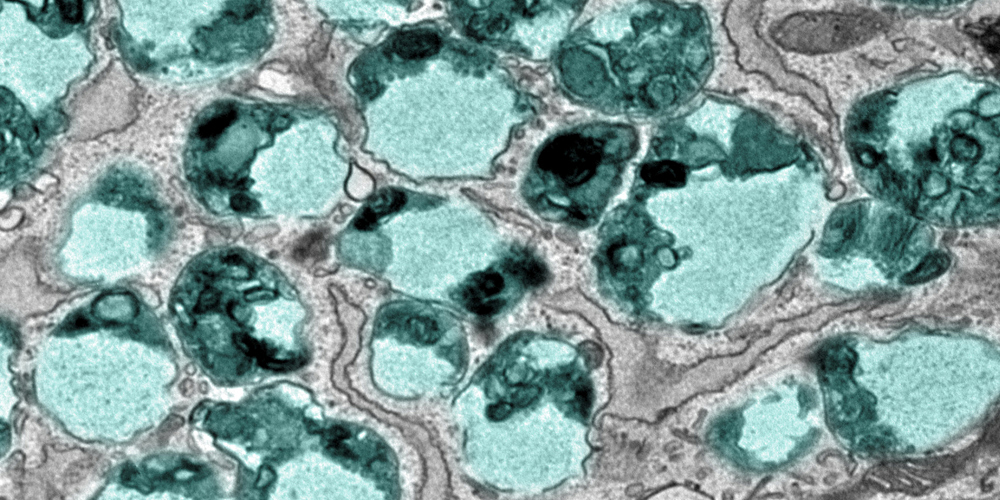New target to treat severe autoimmune disease
Researchers at the University of Basel have made significant progress in understanding a rare but serious immune disease. The team has uncovered critical mechanisms involved in the cellular recycling process, thus providing novel therapeutic approaches.
30 September 2024 | Heike Sacher
LRBA deficiency is a rare and severe autoimmune disorder that was first described in 2012. This disease is characterized by an impaired immune response and autoimmunity. LRBA deficiency typically manifests in early childhood and leads to a variety of health issues, such as growth and developmental delays.
The research group led by Professor Anne Spang at the Biozentrum of the University of Basel, in collaboration with Goethe University Frankfurt, has made a significant breakthrough in understanding the cellular processes underlying this disease. In their recent study, published in the Journal of Cell Biology, the researchers reveal that two distinct cellular recycling steps are disrupted in patients. The findings provide new insights into the cellular mechanisms of LRBA deficiency and open up new avenues for potential therapies.
New findings on LRBA deficiency
“In patients suffering from LRBA deficiency the protein LRBA is absent in cells due to a genetic mutation,” explains first author Viktória Szentgyörgyi. “We have now demonstrated that, unlike in healthy individuals, patient-derived cells exhibit a strong accumulation of enlarged endolysosomes.” Endolysosomes are cell organelles that play a key role in the degradation and recycling of proteins. The accumulation of enlarged endolysosomes caused by LRBA mutations leads to severe cellular dysfunctions in LRBA-deficient patients, manifesting in serious health issues such as recurrent infections and inflammatory bowel disease.
“In patient-derived cells, we also observed an increased secretion of endosomal and lysosomal proteins,” explains Szentgyörgyi. “Normally, endolysosomes and lysosomes degrade proteins into their basic components – amino acids – which can then be reused by the cell to synthesize new proteins”. The increased secretion of proteins by these organelles indicates a defect in the recycling process, leading to inflammation and tissue damage.
Two defective recycling steps
Cells employ multiple recycling pathways. The first pathway recycles proteins that have been internalized by the cell, returning them to the cell membrane for re-use. The second pathway is responsible for the trafficking of damaged proteins from the membrane to endolysosomes and lysosomes for degradation. It was already known that the first recycling pathway to the cell membrane is disrupted in LRBA-deficient patients. This pathway is the target of current therapeutic interventions to treat the autoimmune disease.
The cellular recycling defects in LRBA-deficient cells, discovered by Spang’s team, specifically affect the second recycling step. In this process, the endolysosomes fuse with lysosomes in order to digest proteins, which is essential for cellular function. “We observed in patient-derived cells that defects in this pathway are associated with an accumulation of enlarged endolysosomes and a substantial increase in lysosomal secretion,” says Szentgyörgyi. LRBA therefore plays a key role in both recycling processes. The loss of LRBA leads to cellular recycling defects, resulting in immune system dysfunction with serious implications for patients.
New targets for treating LRBA deficiency
The study provides novel insights into the cellular mechanisms of LRBA deficiency. For this previously difficult-to-treat disease, caused by mutations in the LRBA gene, future treatments may now consider targeting the second recycling pathway in the cell. These findings on the role of the LRBA protein in the cell's recycling system offer new therapeutic strategies for treating LRBA deficiency.
Original publication
Viktória Szentgyörgyi, Leon Maximilian Lueck, Daan Overwijn, Danilo Ritz, Nadia Zoeller, Alexander Schmidt, Maria Hondele, Anne Spang and Shahrzad Bakhtiar
Arf1-dependent LRBA recruitment to Rab4 endosomes is required for endolysosome homeostasis. Journals of Cell Biology.
Journal of Cell Biology (2024), doi: 10.1083/jcb.202401167



